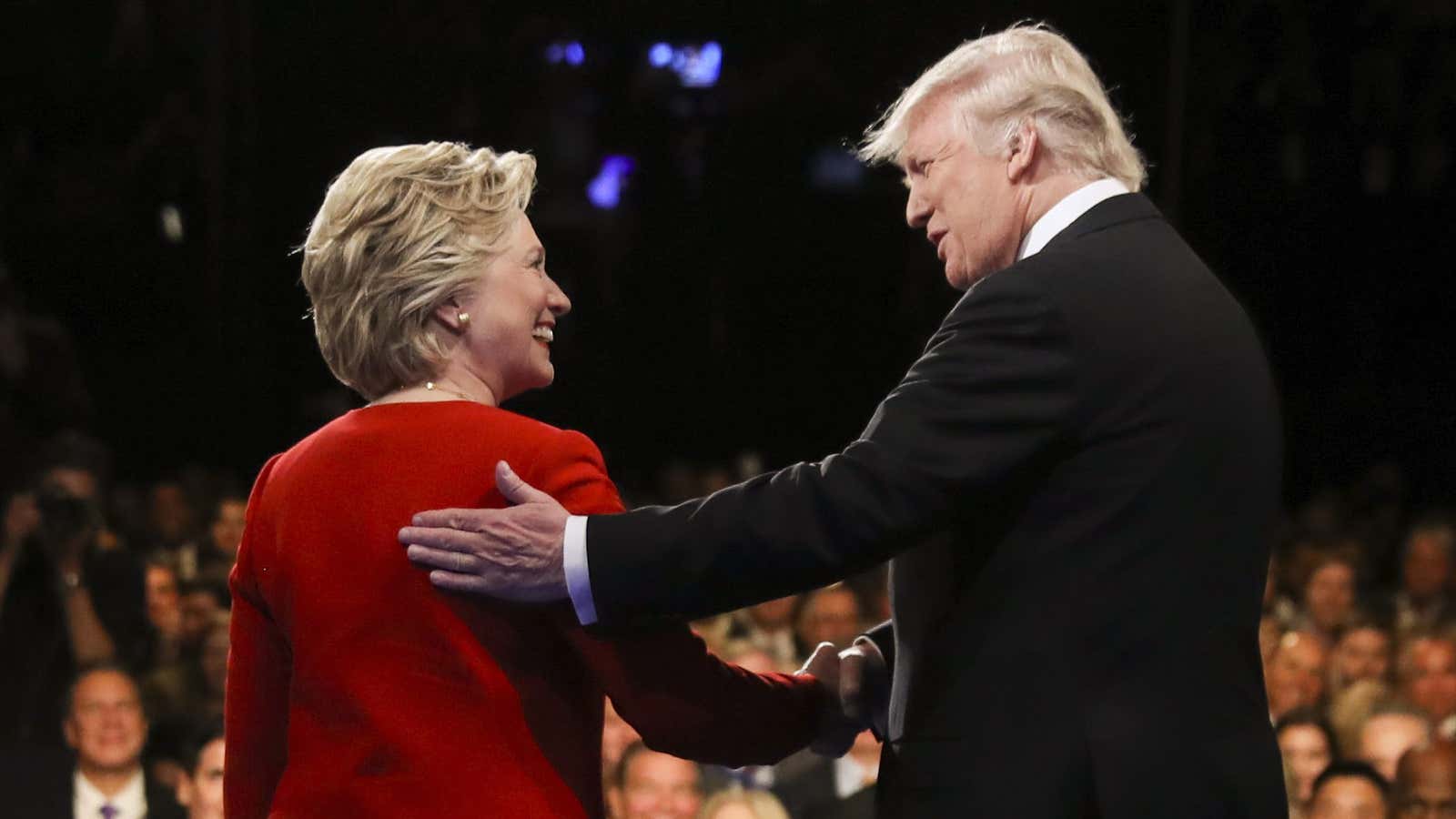The bar is very different for Donald Trump and Hillary Clinton when they meet for their second debate of the US presidential election on Oct. 9. For Trump, it’s make or break. For Clinton, not so much.
With his poll numbers plunging, Trump’s night must be perceived as an outright shellacking of Clinton. Not winning on points, and definitely not a tie. He must score an indisputable victory.
Clinton, conversely, has a smaller challenge: With a month left in a two-year long campaign, she merely has to hold her own, and hold on until Election Day (plus hope that her voter turnout operation does its job).
If Clinton cannot achieve this bar–if she is clearly defeated by Trump–he still has a chance to win election in November, as long as he can turn out his base and swing enough undecided voters his way. But his chances will plummet if Clinton can simply keep the outcome neutral.
This conflicting dynamic will drive what we witness in their second of three direct face-offs, this one taking place at Washington University in St. Louis, Missouri. Trump will set out to be firm, pointed but flamboyantly courteous–we will hear about Clinton’s 33,000 erased emails, her use of the word “deplorables” to describe Trump supporters, and Bill Clinton’s recent declaration that Obamacare is “crazy.” But Trump likely won’t hector Clinton as he did in the first debate–that would give her the edge.
At the Washington Post, Greg Sargent calls this Donald persona the “self-effacing” Trump. And there is precedent for it, says Bloomberg’s Kevin Cirilli. Watching Trump at a dress rehearsal in New Hampshire on Oct. 6, Cirilli tweeted:
But Clinton is likely to be wise to this Trump affectation if he chooses to use it. To rattle him, she will probably needle him incessantly. She will hit his soft spots, challenging whether he ever paid federal taxes, whether he really gives away any money to charity–and whether he really is a billionaire. She will again quote him on Putin, on trashing women’s looks, and on his desire for nuclear weapons proliferation.
The aim of this strategy will be to push Trump off his game, and get him to defend his perceived dignity and honor, recalling galling slights against him rather than sticking to the case for a Trump presidency. Trump advisers will probably have him on guard and prepared for this maneuver. He surely has been coached to maintain a serene smile. But Clinton will gauge that he simply won’t manage 90 minutes of control over his well-documented impulse to self-inflate, slash, and hit back.
Here is a taste of what’s coming in a new Clinton video, which she promoted in a tweet.
What is plain is that neither candidate seems interested in managing expectations. Prior to their first encounter, on Sep. 29, Trump’s camp set the bar low for his performance against the more practiced Clinton. This time, there has been very little in the way of head fakes or psychological warfare. Watch this video from the Huffington Post:
Trump is actually prepping all day today, we are told, which suggests he may be taking this encounter more seriously than the first. With the media’s propensity to gamify these encounters, he’s received the message that he looked like a loser in the first debate, even as he and his surrogates spun it the other way in the days that followed.
The media–and really the public–is subconsciously mindful of the seductiveness of suspense. Reporters and pundits will hate to call the election over a month before voting happens. So one possibility is that, even if Trump totally loses his temper, commentators will find a way to call the debate close, and push the narrative out to the third and final debate on Oct. 19.
What will be a sign that Trump is blowing it? If we hear him hint at or mention Bill Clinton’s infidelities, or Hillary Clinton’s alleged ill treatment of his lovers, he’s been thrown off balance. An unforced error such as that will accelerate the exodus of his already weak support from independent women. It will mean Clinton’s needling, probing attack of his ego has worked. And it will suggest that no amount of media spin is likely to rescue his campaign from the inevitable.
